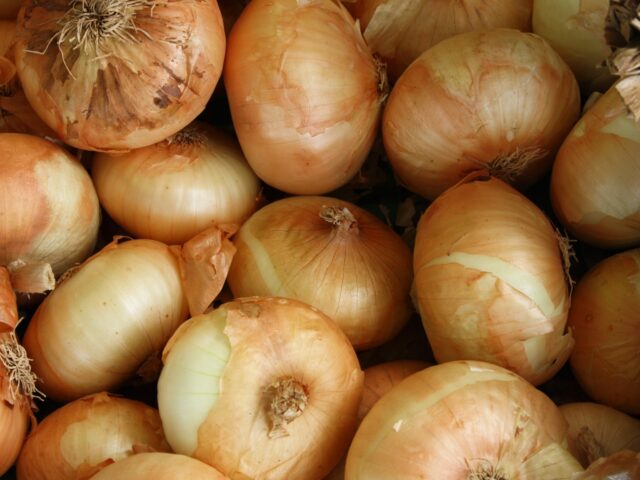Filipinos visiting the United Arab Emirates (UAE) are packing their suitcases with an unusual souvenir: onions. Filipino cooking uses a lot of onions, and inflation is making them unaffordable back home, but the UAE sells them for a fraction of the price.
The National on Wednesday quoted Filipinos who said Emirati red and white onions sell for about $1.50 per kilogram, while they’re paying $10 or more back home, so onion tourism makes sense:
Jonathan Sibol, an animal trainer in Abu Dhabi, said he would be packing onions in his suitcase on his next flight to the Philippines.
“Onion is a very important ingredient for cooking in the Philippines, but sadly the price there is 600 [Dh40] pesos per kilo,” he said. “If I get a chance to go home, I will bring onions with me because it’s cheaper here. It’s practical, and you’d save more money. […] For now, this is a major problem in our country — the lack of supply and high prices of onions. Hopefully, prices will be back to normal soon.”
Some Filipinos posted triumphant photos of their onion-laden luggage, as though they had just bagged a monster fish on a deep-sea expedition, while others seemed nervous that they might be violating import restrictions and stumbling into some black-market onion trade.
“In the Philippines, onions are gold. Here in UAE, there are mountains of onions,” a public service program for Filipinos working abroad helpfully informed its listeners.
A large number of Filipino migrants work in the United Arab Emirates, typically living frugal lives in crowded apartments while they send most of their salaries back home. The UAE is second only to Saudi Arabia as an importer of Filipino labor.
To borrow a phrase often used in discussions of American immigration, they do the jobs Emiratis just will not do, and they are not always treated well. Groups of Filipino migrants have compared their working conditions in the UAE to slavery, complaining of low wages, long hours, poor living conditions, and physical and sexual abuse.
On the other hand, Filipino labor in the UAE is increasingly stepping up from manual labor and domestic services – the stereotypical Filipino maids and nannies – to include more highly-compensated professional services like engineering and medicine. That means a sizable number of Filipinos in the Emirates have disposable income and suitcases that can hold a large number of onions.
There is indeed a black market for onions in the Philippines. Customs officials in December seized two smuggled cargoes of onions worth over $300,000, one hidden in a shipment of clothing and the other stuffed into pastry boxes from China. Philippine police followed up on these hefty seizures with calls for an onion-smuggling task force, while President Ferdinand Marcos, Jr., suggested the government might as well sell the seized onions to eager chefs.
The usual suspects have tried to blame the Philippine onion crisis on global warming – by which they mean the area gets hit by typhoons with some frequency, and typhoons are rough on onion farms – but opposition politicians accuse Marcos of talking about climate change to distract from foolish farming and import policies set by his secretary of agriculture, who also happens to be Ferdinand Marcos, Jr.
On Monday, Time magazine noted there might even be sinister criminal onion cartels in the mix, making already-painful global inflation worse by choking off supplies until a pound of onions cost more than a pound of beef:
The business sector blames the agriculture department for failing to make accurate supply projections despite warnings last year. Agriculture officials forecast possible shortages of onion and garlic as early as August, when the local red onion variety only cost at most 140 pesos ($2.54). However, the department resisted importations, insisting that existing supply would be sufficient, even as Philippine farmers warned consumption was expected to rise during the holidays.
Agriculture officials suspect other local crises, such as internal price manipulation, share responsibility for the skyrocketing onion prices, too. Restoperez said on Dec. 13 that the agriculture department believes a criminal syndicate hoarded onion supply, and an investigation is underway.
The Marcos administration’s responses to the onion shortage have all been completely ineffective, including price controls his government can’t actually enforce, import plans that big exporters like China are not eager to cooperate with, and demand projections that fall comically short of reality in a country where virtually every dish includes onions.
As Time noted, even Marcos’ idea to sell onions seized by the government from smugglers was a bust, because too much of the cargo was contaminated with E.coli and illegal pesticides.

COMMENTS
Please let us know if you're having issues with commenting.